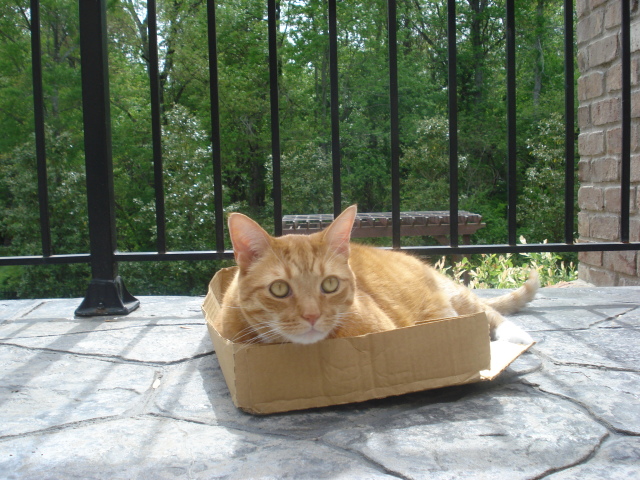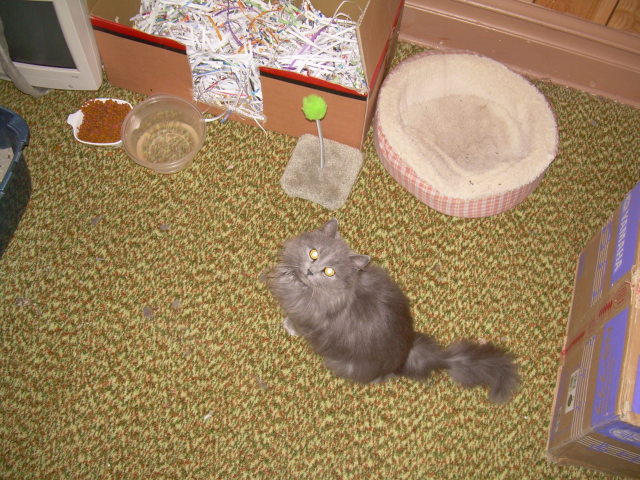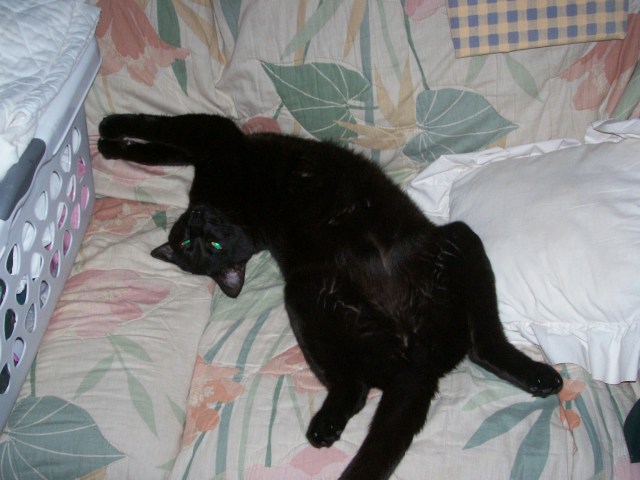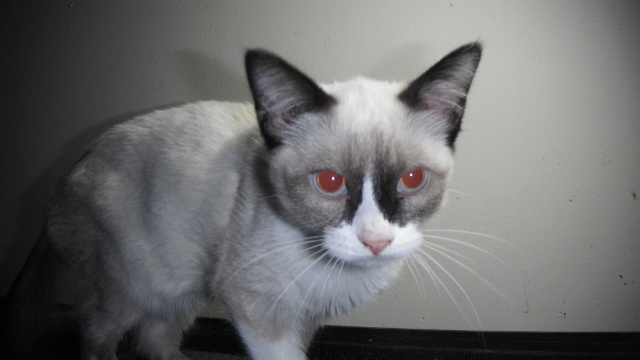QuestionHi Ali,
How's Canada? I hope to visit someday. We were adopted by a young mama cat (a year old, tops) and her 4 kittens. They are staying under the porch where it is dark and safe. I have gained mama's trust and the kittens are starting to recognize my voice but they still scamper when they see me. How do I capture them? I have homes for them. Also we have an indoor cat 9 years old. We want to keep the mama cat, but don't know how to introduce her to our female and also what about the transition with mama cat without her kittens. They are about 8 weeks old and 99% weaned. They are eating moist food and milk. We also want to spay mama cat, do you think she is old enough and is it too soon after just having a litter? Thanks so much Ali!! Take Care.
AnswerJudy,
It would probably be best to bring mom and babies indoors and allow mom's milk supply to dry up for about 2 weeks. Your vet won't likely agree to spay mom if she is still producing milk. As for feeding the kittens cow's milk it's best not to do that as it doesn't contain the proper balance of protein, fat, calories, etc to support a kitten's nutritional needs. Feeding a commercially available weaning formula added to a good quality holistic dry food would be far better for them. I normally suggest that kitty caregivers add a tablespoon or so of unsweetened, full fat, plain organic yogurt to the kibble/weaning formula mix. The reason for this is so that the kittens won't be as likely to have loose stools and risk becoming dehydrated fairly quickly as a result. Yogurt naturally contains enzymes and beneficial bacteria normally found in the digestive tracts of mammals. Yogurt is different from giving milk in that most cats don't tend to have any discomfort or diarrhea from ingesting it. It is a common misconception that cats and kittens must have cow's milk - although many cats enjoy the odd saucer of milk the vast majority of felines are actually lactose intolerant from about the time they are weaned onward. Yogurt is a tasty treat that many cats can enjoy and it has the added benefit of actually decreasing the effects of diarrhea when certain medications are used because it replaces the good bacteria and enzymes that can be destroyed.
The most effective way to catch mom and kittens would most likely be to use a humane live trap and bait it with something irresistible to cats such as tuna, salmon or sardines. You will be able to catch them one or more at a time that way and begin socializing mom and her babies. Due to the fact that these kittens haven't been handled by human beings and they are a bit fearful it may be very difficult to find them a forever home where their humans are committed to working with them, easing their anxiety and gaining their trust. Socializing these babies may be quite difficult so I would strongly suggest that you not re-home them until they are comfortable with human contact and they have been properly socialized. The reason for this suggestion is to avoid the possibility that one or more of the kittens will become aggressive as a result of being fearful or anxious and being placed into an unfamiliar environment. It's best to put mom and her kittens in a room behind a closed door and work towards gradually gaining their trust so that they can be easily handled. In cases like this I normally recommend that people take time several times a day to go into the kitty's temporary home and sit down quietly on the floor. It's important to avoid touching the cats, talking to them or making eye contact with them until they are ready to accept that. Cats are naturally very curious and will generally initiate interaction over time and providing yummy rewards like cooked chicken, fish, etc will provide positive reinforcement. In other words once the kittens and their mother work up the courage to come to you and rub against you they will quickly realize that doing so is very rewarding because of the special treats that come their way. I know that it will most likely be tough to go into a room and avoid any kind of interaction with mom and her babies at least until they initiate contact with you, that's why I normally suggest that you bring something into the room with you that is quiet and will act as a distraction for you such as a book, crossword puzzle, or any other hobbies that work for you. It's very important to realize that gaining the trust of this little family isn't going to happen overnight. It would probably be best for the kittens to stay with each other and their mom until they are comfortable being handled. In my experience it's best to introduce these babies into households where there aren't any young children as this can certainly increase the potential for fear based issues.
Once the mom and her babies are inside and behind a closed door I would suggest that you try out a homeopathic remedy called Bach's Rescue Remedy. This remedy is a very safe and effective choice used by pet parents and some vets worldwide to treat fear and anxiety in their pets in a variety of situations. As far as dosing goes I think that in mom's case you can add it to her fresh water each morning, about 7-8 drops per day should do it. As far as the kittens go you could either add their Rescue Remedy to their softened hard food or if they are okay with drinking water then allow them to share mom's dose with her from the water bowl. It has been my experience that giving Rescue Remedy directly from the dropper that comes with the bottle is somewhat offensive as far as cats are concerned. The homeopathic remedy is preserved in a solution of grape alcohol and cats don't like the smell or taste which is why I recommend that you give them Rescue Remedy in a water bowl or a food that will disguise the smell and taste.
It's also very important to be sure that mom and kittens aren't exposed to situations where they may contract viral or bacterial infections as a result of not being vaccinated. This means that once the little family is indoors it will be important to ensure that everyone who handles them washes their hands thoroughly with hot, soapy water prior to handling the kittens or cleaning out food/water dishes and litter boxes. Hand washing afterwards is also important. By washing your hands after handling mom, her kittens, their food/water bowls and litter box contents you will ensure that you don't unintentionally pass on any infections to your own resident cat. Mom can't be vaccinated until she has completely weaned her kittens and she isn't producing milk any longer. As far as flea control goes Advantage is safe to give to nursing moms, but not kittens under 6 or 8 weeks old - it gets rid of any fleas on mom or her babies simply because they spend their time fairly close to her. Your vet will be able to determine the age of these babies by examining them and he/she will likely decide whether or not they are able to be treated with flea control products like Advantage based on their age and health status. Removing intestinal parasites with dewormers such as Drontal is also important. By using a dewormer that kills hookworms, roundworms and tapeworms you may not have to deal with trying to handle under socialized kittens any more than once or twice. It's very important that the vet and his/her staff are made aware of the fact that the mom has been living on the streets and may be a bit uncomfortable with extensive handling and that the kittens haven't yet been socialized. Vaccines should likely be started for the kittens if they are 8 weeks old as the antibodies they were receiving from mom's milk are beginning to wear off if they aren't nursing as often.
It's very important that the mom and her young family be exposed to as many calm, gentle and quiet people as possible provided that these people are mature enough to understand why it's so important to let the cats come and initiate the attention. The best way to help mom and her babies live happy, peaceful lives in forever homes is to provide them with experiences that consistently demonstrate the benefits of learning to trust human beings. Many people believe that it's impossible to tame a kitten that's missed out on socialization and human handling for the first 8+ weeks of life. I have been able to help cats get comfortable with handling and gently socializing them. I would strongly suggest that you take some time and sit down with your family, talk about whether or not everyone is prepared to commit to helping this little family. To be honest there will be some times when you feel as though you aren't making any progress with these kitties, however the rewards are incredible if you work slowly and gently. These kittens have the potential to make loving companions, but it certainly hinges on the level of calm, patient commitment and work that everyone is willing/able to put into this. If you aren't prepared to commit to gradually socializing these kitties then I would suggest that you consider speaking with a local stray/feral organization that is willing to trap, vaccinate, neuter and release these guys or you check with shelters and rescue groups in your area to see whether or not they would be willing to provide foster homes for the small family. As far as proper introductions to your resident cat goes I would suggest that once the mom trusts you completely and allows you to handle her that you follow the instructions that I've given in my numerous past answers on the subject. One of the most common questions I have answered since becoming an expert on this site is essentially to explain how best to complete new cat/kitten introduction.
Since female cats can become pregnant fairly shortly after giving birth to a litter it's likely that this mom is already pregnant again so the only way to ensure that the continuous breeding cycle stops is to have mom indoors where she no longer has access to intact male cats. Your vet may be able to tell you whether or not the queen is pregnant by performing a thorough physical exam and an x-ray. If mom is pregnant then you have to make a decision about whether or not you are comfortable with spaying her and terminating her pregnancy. Some vets won't spay pregnant queens and others will charge a substantial fee for a complicated spay like this. There is a possibility that mom could be as much as a month or more along already in a 60-68 day gestation. If you opt not to have mom spayed while she's pregnant then you will need to wait until after she gives birth, nurses her young and teaches them how to be well behaved and well socialized cats. I usually recommend that kittens be allowed to stay with mom and their siblings for a minimum of 10-12 weeks. Many people believe that taking a kitten from mom prior to or as soon as he/she is weaned is the best option for them.
In my experience separating kittens too early from their mother and siblings can account for a number of serious behavioral issues (inappropriate rough play that may involve biting, scratching, etc with human caregivers) and many kittens develop self soothing behaviors that serve essentially the same purpose as a child holding onto a security blanket or sucking their thumb. Kittens removed from their mother's care too early in life often develop nuisance behaviors such as sucking on fingers, hair, clothing blankets, other pets' coats, etc. Many mothers begin weaning their babies at around 6-8 weeks of age, depending on their temperament and milk supply. The last 4-6 weeks that I recommend kittens stay with their families allows mom and the siblings to teach each kitten how to behave appropriately. It is during this time that important skills like bite inhibition are learned, and trust me, you want your kittens to learn bite inhibition because their teeth are razor sharp. Kittens also learn the value of playing with sheathed claws, again a very important skill if they are to live with human beings. I also usually suggest that kittens be touched and handled as early as a few days old (if mom is comfortable with it) in a quiet environment with mom nearby in a quiet and safe room that other cats within the household don't have access to. If mom seems to be an anxious mom it's best to wait until the kittens are at least a week old and then start gently stroking them while they nurse and doing things like touching their paws and faces. Kittens that are handled gently and properly by human beings learn to trust people fairly early on. If mom is concerned about people handling her babies it's a good idea to simply come into the kitty nursery and pet her, tell her how wonderful she is and that she is doing an amazing job caring for her babies. You can get the kittens accustomed to hearing human voices simply by talking to and touching their mom. Some queens are fairly comfortable with humans handling their kittens provided that they get the attention and affection with a bit of bribery from their human caregivers. Often times with a bit of patience you can persuade mom to allow you to pet her babies during the time that you are petting her.
I have found that feeding a high quality, holistic cat food to a nursing mom combined with adding cooked, pureed meats mixed with a liquid kitten milk replacer will give mom good nutrition and provide her the extra energy needed to care for her family. You can simply mix a commercially prepared meat and broth baby food (minus any salt, garlic, onions or any other unnecessary ingredients of course) with a commercially available kitten milk replacer and about a half tablespoon of organic, full fat, unsweetened yogurt however you will save a bundle by cooking and pureeing your own meats and using powdered weaning formula rather than the ready to serve version.
Female cats can be spayed fairly early on in life - some shelters actually spay and neuter 6 week old kittens prior to placing them in forever homes. It's best if mom is vaccinated and dewormed prior to being spayed. Since mom is a stray she likely has worms from eating small prey animals. If you decide to keep momma cat you will need to consider a few things. This kitty should really be tested for highly contagious viral infections like feline leukemia and FIV which are somewhat similar to how HIV/AIDS lower a person's immune system's ability to fight off mild to severe infections. Some cats who test positive for these viral infections are carriers and won't experience any health complications, however they may well be able to pass it on to other cats that may experience serious health issues. It's also a good idea to have your resident cat tested for the same viral infections so that you know whether or not he/she has been exposed to them. Your vet can make recommendations if one or both of the cats tests positive for these viruses. Feline leukemia and FIV can be passed from cat to cat if they come into contact with an infected cat's saliva, blood, etc. This means that sharing food/water dishes, litter boxes, toys and bedding shouldn't be allowed until you know each cat's status in relation to these viral infections. As I'm sure you realize there are many factors to consider with this mom and her kittens. There is a significant amount of work ahead of you, your friends and your family if you decide to socialize this little feline family and ensure that they find good forever homes. I wish you luck and I would certainly enjoy hearing about how things are going and offering guidance and support as necessary throughout this process.

 Im terrified... my cat may be dying
Question
My Edward
First of all I want to thank you for
Im terrified... my cat may be dying
Question
My Edward
First of all I want to thank you for
 How pregnant is my cat
QuestionQUESTION: I was adopted by a local neighbor hoo
How pregnant is my cat
QuestionQUESTION: I was adopted by a local neighbor hoo
 cat disappeared
Question
pusscat at home
My cat came to me at 6 months
cat disappeared
Question
pusscat at home
My cat came to me at 6 months
 cat breed?
QuestionQUESTION: I have a solid black male cat, and I
cat breed?
QuestionQUESTION: I have a solid black male cat, and I
 albinism
Question
Cat
Hello! I was wondering if you could
albinism
Question
Cat
Hello! I was wondering if you could